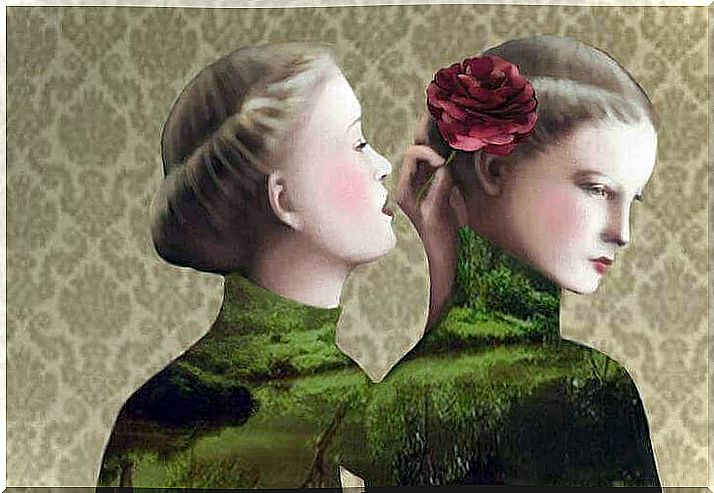Destructive Criticisms: A Problem For Those Who Make Them

Sometimes it happens that you criticize and judge yourself without any constructive intention. For some reason, there are always people ready to project their negativity and insecurities by judging what others are doing or not, clearly or between the lines. They are people who are dedicated to the transmission and dissemination of what they believe are defects and bad examples.
To a greater or lesser extent, we have all been victims or architects of destructive judgments and criticisms. Criticizing is such a widespread practice that it has allowed the proliferation of television and radio programs based solely on this: trying to harm people by criticizing and judging them. Nowadays, these programs are enjoying ever-growing success with audiences. What is happening? Why do we do this?
Understanding the mechanism of criticism can help us understand how such conduct works. This is why below we explain some of the main causes why people try to attack and harm others through non-constructive judgments and criticisms.
1. Feelings of inferiority
At the base of the criticisms there can be the feelings of inferiority, as well as of superiority. For many people, the feeling of superiority is nothing more than a mask with which to hide their sense of inferiority, a place in which to feel less insecure.
They thus try to satisfy their need to feel strong and superior, even if this leads them to trample on others and damage their image through criticism.
2. Dissatisfaction with oneself
We criticize others in order to reduce our shortcomings. When we criticize others, we self-deceive ourselves into believing that the problem is in them and not in ourselves. When we criticize, we try to convince ourselves that others make more serious mistakes than ours, so that we don’t feel too bad.
In criticizing, we very often reflect what bothers us about ourselves. We project our fears and insecurities. Not accepting some personal characteristics and recognizing others generates rejection and activates criticism. This phenomenon is known as the “rejected ego”.
Jealous and envious people are great generators of criticism. Feeling inferior sets in motion a defense mechanism that consists in bringing down the qualities of the other person through criticism. In these cases, it is common to magnify the defects, which are seen or invented, in the other person.
3. The need to integrate
Some people base their social relationships on criticism of others. Studies tell us that often, in order to become part of a social group, we are led to criticize people belonging to another group. Thus, criticism acts as a reinforcement of that feeling of belonging towards oneself and towards the rest of the members of the group (endogroup).
Criticism is often influenced by the reaction of the rest of the group. If it is reinforced, it will most likely increase in intensity and frequency. Conversely, if rejected, the person will resort to other ways to strengthen their sense of belonging.
Finally, when we are convinced that we are experts in a subject, we can criticize others in order to demonstrate what they know and affirm our position. This is due to a lack of self-esteem and an unresolved or badly resolved desire for admiration, however certainly unsatisfied.
4. Revenge and cowardice
The desire for revenge can be one of the reasons that can lead to criticizing others. Some situations are not fully accepted and therefore remain unresolved. In these cases, criticism is used as an instrument of humiliation and revenge. When we haven’t had the courage to tell someone in the face that they hurt us, we resort to criticism to fill our frustration, anger or dissatisfaction.
Criticism as revenge is closely related to revenge as manipulation. Sometimes he criticizes himself driven by the perverse intention of putting someone against the criticized person, to separate him from a group, isolate him …
5. Narcissism and self-centeredness
When we feel we can expect special treatment, and we are convinced that we are not receiving it, we think that others are indebted to us. Sometimes, due to a narcissistic feeling, we become fixated on the idea that others should be in our service. When we feel that this is not happening, we resort to criticism to complain, belittle and make others feel bad.
Reactions to a criticism
Criticism, in all its forms and regardless of the source, is inevitable. Starting from this assumption, the “law of three thirds” is applied . This law argues that one third of people love us, another third hate us and the last third are people who, even if they don’t know us, give opinions about us.
The negative and destructive power of criticism should not be underestimated. Winston Churchill compared the criticism suffered to real physical pain and a study recently revealed that the experience of rejection, criticism and humiliation are processed by the same area of the brain, the one responsible for processing pain as well.
Better away …
To manage and live with the poisonous social epidemic of destructive criticism, it is necessary to have clear in mind that one must distance oneself from or protect oneself from harmful people. These people are negative beings whose only goal is to devote themselves to poisoning others, for the sole purpose of causing harm.

The best thing to do in these cases is to keep your distance, especially when they try to make us “accomplices” of criticism. Let’s not forget that interaction with these people, in addition to being a very poor exchange, can be harmful to our emotional and social health.
In conclusion, the key is not to be contaminated or involved, as well as not to be hurt by criticism. Let us remember that criticism speaks more of those who criticize than of those who are criticized and that it is, therefore, a problem that is not ours.









